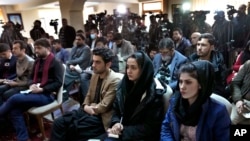Journalists in the southern Afghan province of Kandahar say it has become “impossible” for them to work as news gatherers because of the Taliban’s sweeping restrictions targeting media and journalists.
“We are receiving threats even for a post on Facebook about a stolen bike,” said an editor at a local media outlet in Kandahar who requested anonymity for fear of reprisals, adding that high-ranking Taliban officials “from the government to the district police chief called us, [asking] why we posted the information on Facebook.”
The journalist, who worked for several years in the province, called the Taliban’s restrictions “unprecedented,” and said they are making it “impossible” for journalists to work in the province.
“They want us to publish only what comes from them,” he said, adding that journalists are not allowed to cover any security incidents in the province unless the Taliban wants them to be covered.
Referring to the protest by locals after the Taliban shot a woman in the city of Kandahar in February, the journalist said that “the Taliban did not allow them to cover the protest.”
“Self-censorship is common,” the editor added. “The subjects that we were covering in the past, we cannot even think of covering them now.”
In its annual report, released Tuesday, Reporters Without Border (RSF) said that “themes related to religion, the status of women and human rights in general are off limits.”
RSF’s report underscored that the Taliban’s return to power has had serious implications for the “press freedom and the safety of journalists, especially women,” in Afghanistan.
The journalist said that four radio outlets and a TV station closed in the province after the Taliban seized power there. He added that because of the Taliban’s ban on news and entertainment, the local channels in the province decreased their programming hours to about four to 12 hours.
A survey by the media rights groups found that up to 40% of the country’s media outlets disappeared after the Taliban seized power. It noted that about 6,400 journalists, up to 60% of all the journalists in the country, lost their jobs because of the Taliban’s restrictions and economic difficulties.
A Human Rights Watch report published on March 7 said the Taliban have imposed “far-reaching censorship and violence against media” in provinces. “The situation facing journalists outside Kabul appears much worse than inside the capital, particularly for women,” the report said.
“Taliban harassment and attacks on journalists outside major urban areas have largely gone unreported, causing media outlets in outlying provinces to self-censor or close altogether,” said Fereshta Abbasi, Afghanistan researcher at HRW.
Taliban spokesperson Zabiullah Mujahid tweeted, however, that media outlets are closed because of “their reliance on foreign funding.”
“Currently, we do not have any journalists in our prisons. When a journalist is called to certain agencies for some clarification, it does not necessarily mean imprisonment,” Mujahid said.
A 30-year-old journalist in Kandahar who did not want to be named for fear of Taliban reprisals told VOA the Taliban have imposed more restrictions on the free media in his province.
“Music is banned, we are not allowed to take female callers on our shows, entertainment programs are banned by the Taliban,” they said, noting substantial differences between the situation for media professionals in Kabul and those based in Kandahar.
“[In Kabul] access to information is easier. There are foreign journalists and media reporting on the situation, but here we do not have anyone.”
‘No one stands by us’
“We don’t know what to do. No one to stand by us,” said the broadcaster, explaining that “when the Taliban detained six journalists at their intelligence headquarters, no one was there to help.”
“They say that we should continue our work, but when something happens, they keep silent,” the journalist said of the international community and media watchdog groups, mainly located in Kabul.
He said they had to use their own sources to free colleagues from Taliban detention.
The journalist also said that if he “finds an opportunity,” he would leave the country.
According to a newly published report by theInternational Federation of Journalists, many correspondents hope to leave the country.
“Many journalists are lying low, still hoping to flee the country through whatever means. Estimates suggest that anywhere between 600 to 1,000 journalists have fled the country.”
No future
A 24-year-old reporter who has been working for more than four years in the province told VOA it has not been easy to report from the districts in the province since he began.
“It was difficult to report during the previous government because of the fighting in the districts. And now, it is not easy either,” added the journalist who requested anonymity.
He said that because of the Taliban’s restrictions, it is difficult to go to the districts for coverage. “If we want to go for coverage, we have to get permission and share the subject of our coverage with the authorities.”
The journalist said that before Afghanistan fell into the hands of the Taliban, journalists were facing problems, although “we continued to work independently, without [many] limitations.”
“But now we do not see a future in journalism,” he said.
The 2022 World Freedom Index shows the negative impact of the Taliban’s takeover in Afghanistan, where the country is ranked 156 out of 180 counties, dropping from 122 in 2021.













